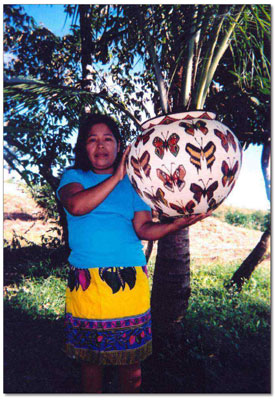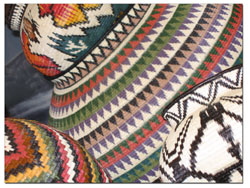| ||||||
Weaving with the Wounaan
by Jules Masterjohn Living with the Internet and the World Wide Web, it seems that all points on this vast blue sphere are at our fingertips. We can easily feel connected to the global world in our information age. It is sometimes difficult to remember that this virtual connection does not replace what “real life” offers. Encounters are most meaningful when they happen in the flesh, with dialogue and true association. There is a unique opportunity for us, living in this arid altitudinous land of the Southwest, to meet artists who live and create in the last remaining rainforest in Central America. Wounaan Indian basket weavers from the Darien Rainforest in southern Panama will be in Durango to demonstrate their unique art form and to raise awareness about their endangered homeland. The Wounaan, whose population numbers between 5,000 and 12,000, live within the lush ecosystem that straddles the border between Panama and Colombia. Scientists estimate that the Darien Rainforest supports one of the highest degrees of biodiversity on the planet today. The inhabitants and the delicate rainforest, challenged by Colombian guerrilla activity and drug trafficking through the area, as well as the expansion of agricultural and lumber interests, face an even greater threat: the completion of the Pan American Highway. The proposal for the Pan American Highway, an intercontinental route connecting Alaska to Chile, was adopted by the Conference of American States in 1923. With more than 80 years of momentum and strong political will, and as much as $200 million dollars committed by the U.S. Federal Highway Administration, the Darien Rainforest is all that stands in the way of this symbolic union between North and South America. Currently, the 15,000 miles of roadway are intact with the exception of the area known as the Darien Gap – a portion of the rainforest that has been designated with a tentative protection status. Though this section has been deemed a National Park by the Panamanian government, powerful economic interests want the Pan American Highway completed for the ease of trade and travel between the continents. A peaceful people who live harmoniously in small groups along the region’s rivers, the Wounaan Indians have become activists to save their only home. As the Pan American Highway construction has impinged upon their native forest, they have worked, as have interna tional environmental and conservation groups like The Nature Conservancy, to negotiate a halt to the highway’s current course. For the last 15 years, their baskets have served as emissaries for the people and the forest, making their way around the world and bringing awareness to the Wounaan struggle. The revenue from their basket sales also help fund their cause.
The Wounaan baskets are technically exceptional. Among some of the only baskets made by Native Americans that do not require pitch or clay to achieve a watertight quality, their baskets have 80 to 120 stitches to the inch. This high density enables a basket to hold water. Just as remarkable are the intricate designs and colorful images. The baskets are created in two basic styles. Geometric designs define the “cultural” style while the “pictorial” style shows designs representing the plants and animals that coexist with the Wounaan. Both types of baskets are made out of the Chunga palm, which comprises the major canopy of the Darien Rainforest. The Chunga is boiled in natural vegetal dyes to create the colorful fibers used to coil the baskets. Beautiful and exactingly functional, the Wounaan women are master basket makers. According to Andrew Hunter Whiteford, an expert in Native American basketry and former curator at the Wheelwright Museum in Santa Fe, “The Wounaan coiled baskets are not only creative in design, but are technically among the finest I have seen.” Durangoan and local shop owner Donna Frank agrees. Fifteen years ago, Frank discovered the Wounaan Indians and their baskets. “They are very smart people. I am inspired by the fact that they are taking charge of their destiny … this really appeals to me.” Motivated to help in efforts to “make sure the road never happens,” Frank has traveled consistently to the rainforest to collect baskets. “I don’t know much about saving the rainforest but I know something about bringing artists out.” Frank has helped the Wounaan basket makers cultivate a respected name and an audience by introducing their work to collectors, galleries and museums. For 10 years, she has been working to bring the Wounaan weavers to the United States. Next week, Fran’s determination and patience will pay off. Hosted by her business, A Shared Blanket, in collaboration with the Center for Southwest Studies, Wounaan women will be demonstrating their basket-weaving techniques. “I think that them coming here and doing this is a major success, even if it is in my little parking lot in Durango,” said Frank, encouraging everyone to meet the weavers at this free event. Translators will be on hand and the weavers will have baskets to sell. All proceeds go to saving the Darien Rainforest. Not only a cultural exchange, the weavers’ visit reminds us of the importance of caring for our planet and its critical habitats like the rainforests, not only for the benefit of the beings that reside within them, but for all beings who depend upon the respiratory process that the rainforests provide. •
|
In this week's issue...
- May 15, 2025
- End of the trail
Despite tariff pause, Colorado bike company can’t hang on through supply chain chaos
- May 8, 2025
- Shared pain
Dismal trend highlights need to cut usage in Upper Basin, too
- April 24, 2025
- A tale of two bills
Nuclear gets all the hype, but optimizing infrastructure will have bigger impact




